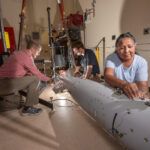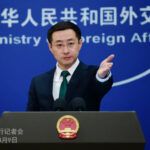50 years ago: The Cuban Missile Crisis and its underappreciated hero
By A. Walter Dorn, Robert Pauk | October 11, 2012
On October 22, 1962, President John F. Kennedy shocked the world by announcing the discovery of Soviet missiles in Cuba and by imposing a blockade on missile-carrying ships moving toward the island. With the superpower navies about to collide, many experts feared an escalation to nuclear war. Though historians have credited American resolve for Soviet Premier Nikita Khrushchev’s decision to stop his ships and withdraw his missiles, resolution of the crisis was actually far more complex.
On October 22, 1962, President John F. Kennedy shocked the world by announcing the discovery of Soviet missiles in Cuba and by imposing a blockade on missile-carrying ships moving toward the island. With the superpower navies about to collide, many experts feared an escalation to nuclear war. Though historians have credited American resolve for Soviet Premier Nikita Khrushchev's decision to stop his ships and withdraw his missiles, resolution of the crisis was actually far more complex. UN Secretary-General U Thant played a crucial mediatory role and received secret urgings from Kennedy to do so.
The newspapers of the day recognized and lauded Thant for his contribution, but US historians later glossed over his role. Nevertheless, State Department and UN archival documents as well as presidential recordings, show that Thant's mediation was vital in helping Kennedy and Khrushchev move away from nuclear Armageddon. Indeed, after the crisis, the president said: "U Thant has put the world deeply in his debt."
Thant's appeals. Thant's first initiative came on October 24, when a naval battle and escalation to war seemed likely. At the urging of many fearful nations, Thant asked Kennedy and Khrushchev to step back and allow time to resolve the crisis peacefully. The Soviet premier turned back many of his ships but kept others steaming to Cuba so as not to appear to back down. Thant's first appeal gave Kennedy the idea to ask Thant to issue a more detailed appeal, requesting that Khrushchev keep his ships away to allow for negotiations. This request was secretly passed to Thant on October 25, complete with the exact wording of the message that the United States wanted Thant to send to the Soviet leader.
The secretary-general sent this second appeal as his own proposal, so it would not appear as an American ultimatum. Khrushchev then used Thant's request to save face while complying. US Ambassador to the UN Adlai Stevenson later described Thant's action to a Senate committee: "At a critical moment — when the nuclear powers seemed set on a collision course — the secretary-general's intervention led to the diversion of the Soviet ships headed for Cuba and interception by our Navy. This was the indispensable first step in the peaceful resolution of the Cuban crisis." Thant's message enabled the superpowers to end their naval confrontation and finally focus on the main issues of the conflict—the missiles and a pending attack on Cuba. In the ensuing negotiations, the secretary-general again played a significant role.
Thant's solution. Fearing that the Soviet missiles were becoming operational, Kennedy was under enormous pressure to invade Cuba. The only peaceful solution he could foresee involved prolonged negotiations preceded by a freeze on missile activity. Thant proposed a faster solution. He foresaw that the Russians would dismantle their missiles immediately in return for an American guarantee not to invade Cuba. He advocated this idea publicly, then privately to both Ambassador Stevenson and Secretary of State Dean Rusk. It became the basis for the final agreement days later, accompanied by a secret commitment by Kennedy to remove US missiles from Turkey.
During some of the tensest moments of the crisis, especially after a US plane was shot down, Kennedy faced pressure from "hawks" to respond militarily. Many references in the ExComm tapes — recordings of the deliberations of Kennedy and his Executive Committee of top advisers during the crisis — indicate that Thant exerted a strong restraining influence. Both Kennedy and Rusk frequently argued for moderation rather than escalation, citing Thant's peace efforts and their hopes that Thant would secure a Soviet pullout.
When the superpower agreement was tentatively reached, Thant flew to Cuba and convinced Castro not to scuttle it and to tone down his rhetoric. Kennedy even lifted the blockade while Thant was in Cuba. Finally, Thant helped find a way to verify the removal of the Soviet missiles after Castro refused a UN supervisory force.
Quiet diplomacy. Certainly Kennedy's resolve played a role in this conflict, but his appreciation of the need to give his opponent an honorable way out was crucial. He wisely used an internationally prominent and skilled mediator to do so. Thant was the consummate diplomat, humble and self-effacing. Less than a year in office, he had already gained Khrushchev's trust on a visit to the Soviet Union that included a friendly swim with the Soviet leader at his Crimean dacha. Kennedy also trusted Thant and later praised his efforts to end the Cuban Missile Crisis. But Thant did not seek recognition; rather he practiced quiet diplomacy and wanted the parties to take the credit.
Historically, however, U Thant deserves a prominent place in accounts of the crisis. The Cuban Missile Crisis was Thant's finest hour. It was the occasion when the secretary-general helped the superpowers pull back from nuclear annihilation.
Editor's note: This article is based on a longer, more in-depth version that appears in the November/December issue of the Bulletin of the Atomic Scientists.
Together, we make the world safer.
The Bulletin elevates expert voices above the noise. But as an independent nonprofit organization, our operations depend on the support of readers like you. Help us continue to deliver quality journalism that holds leaders accountable. Your support of our work at any level is important. In return, we promise our coverage will be understandable, influential, vigilant, solution-oriented, and fair-minded. Together we can make a difference.
Topics: Analysis, Nuclear Weapons
















It is very relevant today, our world leaders should listen to some of the final comments.
Here is the story, to learn from:
The Cuban Missile Crisis: At The Brink (PBS, 1992)
https://www.youtube.com/watch?v=hZcRqkObP2U
Cuban Missile Crisis, Pictures by Dr. Walter Dorn, Royal Military College & Canadian Forces College
https://www.walterdorn.net/pdf/UThant-CubanMissileCrisis_Dorn-Eelhart_Mas-UofT_24Jan2013.pdf
The Cuban Missile Crisis – UN mediated conflict resolution
https://www.youtube.com/watch?v=OVbjeHPls6U
Stephenson & Zorin, UN Security Council debate – October 25
http://www.youtube.com/watch?v=MSV9_J8Csts
(go to 4:00 minutes)